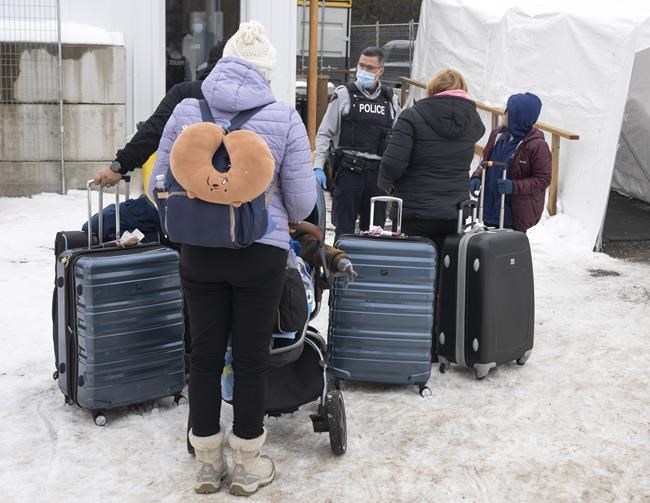HALIFAX — More than 100 asylum seekers who entered Canada through an irregular border crossing in southern Quebec are now in Nova Scotia, and the province’s immigration minister says it is prepared to welcome more.Â
“Nova Scotia is ready, we’re willing and able, and we have room to accept individuals who need a place to come and to call home,” Immigration Minister Jill Balser said following a cabinet meeting Thursday.Â
There are now 113 people in Nova Scotia who entered Canada through Roxham Road — 50 of whom arrived on a bus Wednesday.
The transfer of asylum seekers to Nova Scotia comes as the Quebec government has for months said it could no longer handle the influx of migrants who are entering Canada through an irregular border crossing on its border with New York state.
Balser declined to say how many asylum seekers Nova Scotia is prepared to welcome.Â
“We’re going to continue to monitor," she said. "We haven’t set a cap by any means.”Â
Balser said her department is working closely with the federal government on accommodations, settlement needs and work permits for the would-be refugees, who can stay in a hotel for up to 60 days upon arrival.
The federal government has reported that more than 39,000 people claimed asylum in Quebec in 2022 after crossing into Canada outside official ports of entry, mostly through the Roxham Road crossing.Â
Prime Minister Justin Trudeau said last week while visiting Halifax that if the Atlantic provinces welcome asylum seekers from Quebec, Ottawa will shoulder the cost.
Balser said the federal government will pay for hotel stays, but that further details of the financial support Nova Scotia will receive from Ottawa to welcome asylum seekers are “still in the works.”Â
The minister said she plans to work with community organizations to help newcomers find longer-term housing. The minister said the province is partnering with Immigrant Services Association of Nova Scotia, the YMCA and Halifax Refugee Clinic.
Balser also expects the Annapolis Basin Conference Centre in southwestern Nova Scotia will offer temporary housing to newcomers, as it did for some of the Ukrainian refugees who have arrived over the past year.Â
All four Atlantic premiers have expressed openness to bringing in some of the migrants who are crossing into southern Quebec through Roxham Road. Quebec Premier François Legault has pleaded with Ottawa to transfer some of the tens of thousands of asylum seekers who have arrived in the province through that route to other provinces.
In an email Thursday, a spokesperson for Quebec's Immigration Department said "the impact of the massive arrivals of asylum seekers is increasingly being felt on public services and access to housing, thus threatening Quebec's ability to take charge of the reception of asylum seekers with dignity."
To date, New Brunswick's Immigration Department said 18 asylum seekers had arrived in the province. Premier Blaine Higgs said some 150 to 200 individuals could be transferred to New Brunswick.
In Newfoundland and Labrador, Immigration Minister Gerry Byrne said he’s still waiting for more information from the federal government about what kind of support will be available for the province to accept asylum seekers.
Newfoundland and Labrador is wide open to newcomers, Byrne said, pointing to its recent efforts to welcome government-sponsored refugees and Ukrainians fleeing the war in their home country. But Byrne said welcoming asylum seekers will come with a different set of challenges and, despite Trudeau’s promise last week, it’s not yet clear how Ottawa will help the province meet those challenges.
“These are very vulnerable populations, very vulnerable people from diverse backgrounds,” Byrne said in an interview, adding assistance will include income support, housing and language training.Â
With federally sponsored refugees, much of that is arranged and covered, but that's not the case so far with asylum seekers from Roxham Road, Byrne said.
This report by The Canadian Press was first published March 2, 2023.
---
This story was produced with the financial assistance of the Meta and Canadian Press News Fellowship.
— With files from Sarah Smellie in St. John's.Â
Lyndsay Armstrong, The Canadian Press



